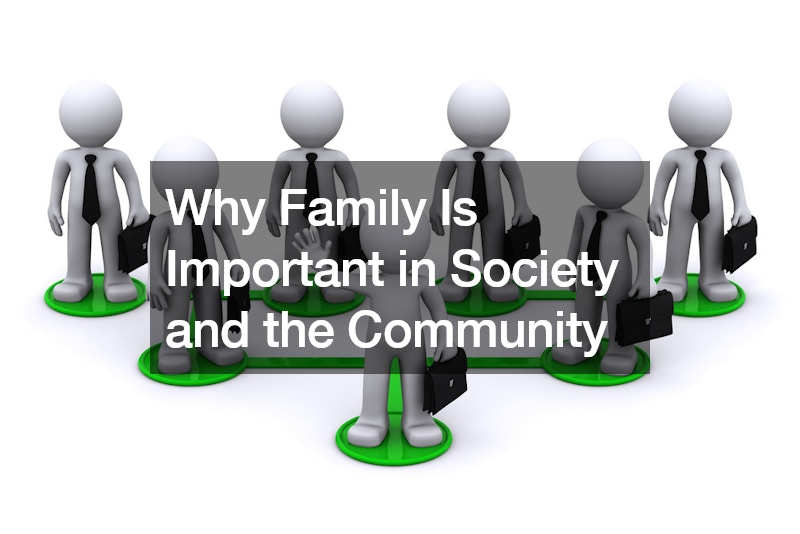Family plays a crucial role in shaping society and the community at large. Whether your family is interested in a ballet class, sports season, or home remodeling, the importance of family units cannot be understated, as they provide the foundation for individuals to grow and thrive. In this article, we will explore the various ways in which family influences society and contributes to community development. Consider a deck repair service as well.
What is the role of family in society?

Family serves as a support system for individuals, offering love, guidance, and encouragement in times of need. This support system is essential for fostering a sense of belonging and security in society.
Furthermore, families play a key role in transmitting values and beliefs from one generation to the next. Through shared experiences and traditions, families help shape the moral compass of individuals and instill a sense of right and wrong. It’s important to know when to trust others with projects as well, like garage door companies, a local roofer, local home builders, and local surrogacy agencies.
In addition, family provides emotional bonding and connection, which is crucial for maintaining mental and emotional well-being. Strong family ties promote resilience and help individuals navigate the challenges of life with confidence.
How does family contribute to community development?
Family involvement in community development is essential for creating a strong and vibrant society. Families often engage in volunteer opportunities, such as helping out at local events or participating in charity drives, which fosters a sense of unity and solidarity within the community.
Moreover, families play a role in building social connections within the community. By attending neighborhood gatherings and school functions, families contribute to the social fabric of society and promote a sense of togetherness.
Families also provide educational support to children, which is crucial for the intellectual development of future generations. Parents who are actively involved in their children’s education help create a culture of learning and academic achievement within the community.
What are the benefits of strong family units in society?

Strong family units in society offer a myriad of benefits, including improved mental health outcomes. Individuals who come from supportive and nurturing family environments are more likely to experience positive mental well-being and emotional stability.
Additionally, strong families contribute to reduced crime rates within society. When individuals feel connected and supported within their family units, they are less likely to engage in criminal activities or antisocial behaviors.
Furthermore, strong family units promote healthier lifestyle choices, such as regular exercise and balanced nutrition. Families that prioritize health and wellness set a positive example for their children and help instill lifelong habits that contribute to overall well-being.
How does family diversity contribute to a strong society?
Family diversity enriches society by bringing together individuals from different cultural backgrounds and traditions. This diversity fosters tolerance and acceptance, creating a more inclusive and harmonious community.
Moreover, family diversity promotes innovation and creativity within society. When individuals are exposed to a variety of perspectives and experiences within their families, they are more likely to think critically and devise creative solutions to complex problems.
Additionally, diverse families expand perspectives and broaden horizons, leading to a more well-rounded and interconnected society. By embracing diversity, families contribute to a vibrant and dynamic community that is open to new ideas and experiences.
What challenges do families face in today’s society?

Although families play a critical role in society, they also face numerous challenges in the modern world. Financial struggles are a common issue for many families, as they try to make ends meet amidst rising costs of living and stagnant wages.
Work-life balance issues are another challenge that families grapple with, as they try to juggle the demands of work, school, and other responsibilities. Finding time for quality family interactions can be a struggle in today’s fast-paced society.
Furthermore, technology dependency poses a challenge to families, as screens and devices increasingly take up our time and attention. Balancing screen time with meaningful family interactions is a constant struggle for many households.
How can society support and strengthen family units?
Society can support and strengthen family units by implementing family-friendly policies that prioritize the well-being of families. Access to affordable childcare, parental leave options, and community support programs can all help families thrive in today’s society.
Mental health resources and education and awareness campaigns can also play a crucial role in supporting families and promoting emotional well-being. By providing families with the resources they need to navigate challenges and build resilience, society can create a supportive environment for healthy family dynamics.
Furthermore, promoting work-life balance and encouraging family time can help strengthen family units and foster a sense of togetherness within society. By valuing and prioritizing family connections, society can create a more supportive and nurturing environment for families to thrive.
What impact does family breakdown have on society?

Family breakdown can have far-reaching consequences for society, impacting individuals, communities, and institutions. Children who come from broken families may experience negative effects on their emotional and psychological well-being, leading to long-term consequences for their development.
Moreover, family breakdown can place increased strain on social services, such as child welfare agencies and mental health providers. When families are unable to provide a stable and supportive environment for their children, society must step in to offer additional support and resources.
Additionally, family breakdown can lead to higher rates of crime and substance abuse within society. Individuals who lack strong family ties and support systems are more vulnerable to engaging in risky behaviors and criminal activities, which can have a detrimental impact on the overall safety and well-being of society.
How do family values shape societal norms and behaviors?
Family values play a crucial role in shaping societal norms and behaviors, influencing how individuals interact and engage with one another. Ethical decision-making and moral integrity are often instilled within family units, creating a foundation for ethical behavior within society.
Moreover, respect for others and empathy and compassion are values that are cultivated within families, promoting a sense of connectedness and understanding within society. Families that prioritize kindness and empathy set a positive example for others and contribute to a more compassionate and caring community.
Furthermore, family values promote social responsibility and goal-setting, encouraging individuals to strive for personal growth and contribute positively to their communities. By instilling values of hard work and perseverance, families help shape individuals who are driven to make a difference in society.
What role do grandparents play in the family and society?
Grandparents play a vital role in the family dynamic, offering wisdom, experience, and love to their grandchildren. They often serve as a bridge between generations, passing down traditions and values that help shape family identity and preserve cultural heritage.
Furthermore, grandparents provide emotional support and guidance to their grandchildren, offering a sense of stability and security within the family unit. Their presence can be a source of comfort and reassurance for young family members during challenging times.
In addition, grandparents play a practical role in the family by providing childcare assistance and helping with daily responsibilities. Their involvement in the lives of their grandchildren can create strong bonds and lasting memories that enrich the family experience.
How does family influence educational outcomes in society?
Family involvement in education is a key factor in determining educational outcomes for children and youth. Parents who are actively engaged in their children’s learning help set high academic expectations and promote a love for learning within the family.
Moreover, families that support academic achievement and provide a nurturing learning environment contribute to higher educational aspirations for their children. By fostering a culture of academic excellence within the home, families help set the stage for future success in school and beyond.
Furthermore, family involvement can help address learning challenges and provide additional support for children who may be struggling academically. By working together with teachers and schools, families can create a collaborative and supportive environment that promotes academic growth and development.
What are the societal implications of family values and traditions?
Family values and traditions have far-reaching societal implications, shaping how individuals interact and engage with one another. Cultural preservation is often upheld within families, passing down customs and practices that help maintain a sense of identity and heritage within society.
Moreover, family values promote community cohesion and positive social behaviors, encouraging individuals to work together for the common good. By instilling values of respect and responsibility, families help create a sense of unity and solidarity within their communities.
Furthermore, family values contribute to resilience during challenges, providing individuals with a strong foundation of support and guidance. When faced with adversity, individuals who come from nurturing and supportive family units are better equipped to navigate difficult circumstances and emerge stronger on the other side.
How does family influence career choices and success in society?
Family plays a key role in influencing career choices and success for individuals, providing guidance, support, and encouragement along the way. By role modeling work ethic and professionalism, families help instill values of hard work and dedication that are essential for career success.
Moreover, families support career exploration and encourage their children to pursue their passions and interests when it comes to choosing a career path. By offering guidance and advice, families help individuals make informed decisions about their future and set goals for their professional aspirations.
Furthermore, families provide emotional support during career challenges and setbacks, offering a safe space for individuals to discuss their experiences and seek guidance. By fostering a supportive environment, families help individuals overcome obstacles and achieve their career goals with confidence.
What impact does family communication have on societal relationships?
Effective family communication plays a crucial role in shaping societal relationships, influencing how individuals interact and engage with one another. By building trust and intimacy within the family unit, individuals learn important communication skills that can be applied to their relationships outside the home.
Furthermore, resolving conflicts peacefully within the family helps teach individuals how to navigate disagreements and misunderstandings in a positive and constructive manner. By modeling healthy conflict resolution strategies, families help promote understanding and empathy within society.
In addition, family communication teaches individuals how to set boundaries and communicate their needs effectively, which can help prevent misunderstandings and resentments in relationships. By promoting open and honest communication within the family, individuals learn the importance of clear and effective communication in all aspects of their lives.
How does family involvement in community service benefit society?
Family involvement in community service has numerous benefits for society, contributing to a culture of giving back and social responsibility. By instilling values of empathy and compassion within the family, individuals are more likely to engage in volunteer activities and help address community needs.
Moreover, family involvement in community service helps build empathy and understanding within society, fostering a sense of connection and unity among community members. By working together to address social issues and support those in need, families contribute to a more caring and compassionate community.
Furthermore, family involvement in community service creates a culture of volunteerism within society, encouraging individuals to make a positive impact on their communities. By modeling the importance of giving back, families help instill a sense of social responsibility and civic engagement in future generations.
Conclusion
In conclusion, family plays a vital role in shaping society and contributing to community development. From providing emotional support and stability to fostering cultural diversity and resilience, families are at the heart of a healthy and vibrant society. By recognizing the importance of family units and supporting them through challenges, society can create a nurturing environment where individuals can thrive and contribute positively to their communities. Look into a catalog printer, airplanes, and a sun room.



